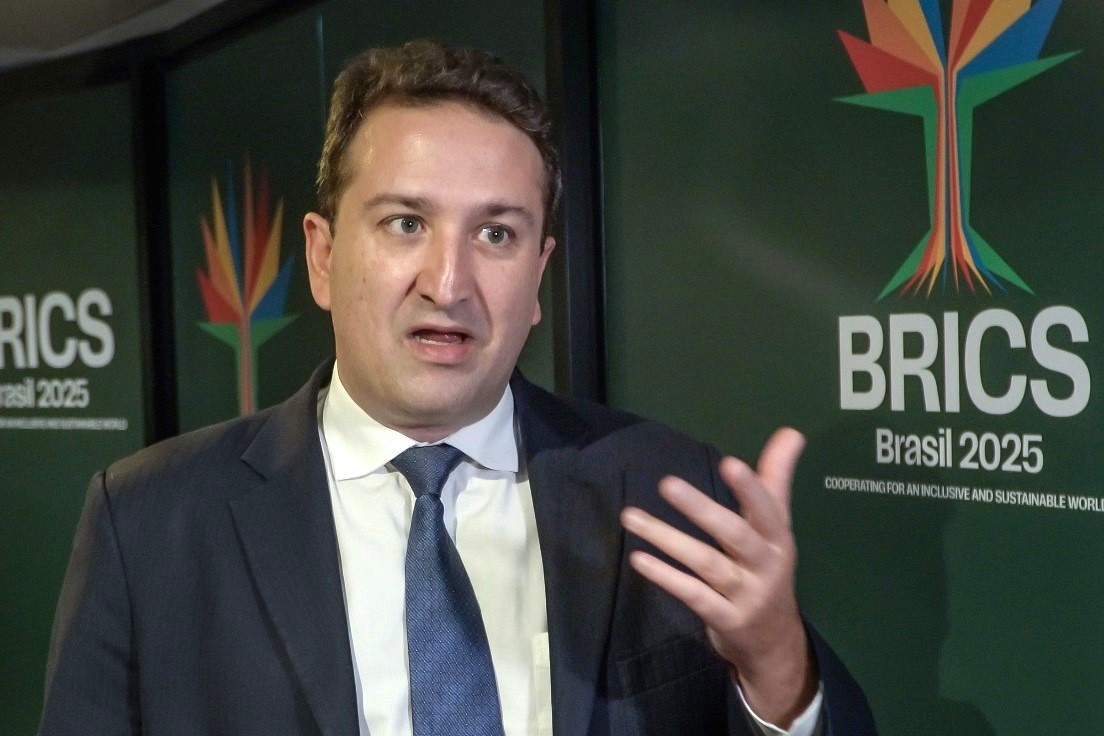BRICS Endorses Tax Mechanisms to Combat Inequality
Antonio Cottas, Deputy Secretary for International Finance and Economic Cooperation at Brasil’s Ministry of Finance, highlights progress on taxing the super-rich during this week’s meeting of BRICS negotiators in Rio

By Mayara Souto / BRICS Brasil
The BRICS negotiators reconvened on Wednesday, July 2, with talks among the bloc’s eleven member states advancing steadily. Economic and financial discussions centered on a key priority: addressing inequalities across the Global South.
“We brought several G20 discussions into the BRICS framework—one of them being the expansion and strengthening of international tax cooperation, including the taxation of so-called high-net-worth individuals, or the super-rich. This was well received by BRICS, though it did require some negotiation effort. And the declaration goes beyond that—it also addresses tax evasion and calls for deeper cooperation among tax authorities,” said Antonio Cottas, Deputy Secretary for International Finance and Economic Cooperation at the Ministry of Finance.
“It’s always a major challenge when you have to bring together the endeavors and perspectives of different countries on what are often highly technical matters. But Brasil’s presidency successfully translated the G20 agenda into the BRICS context, and this was very well executed. BRICS gave its endorsement to tax mechanisms aimed at combating inequalities. That’s extremely important and is yet another consensus that Brasil helped broker. This is something we’re very proud of,” he added.
Cottas explained that the technical debate on finance was currently taking place at the political level of negotiators. “The Ministry of Finance, along with the Central Bank, finalized negotiations on a joint communiqué that addresses topics such as IMF governance reform, international tax cooperation, infrastructure, insurance cooperation, partnerships with the World Bank—several interconnected issues. These are grouped into three overarching themes: first, the integration of new members; second, strengthening intra-BRICS cooperative mechanisms as a complement to the international monetary and financial system; and third, the defense and promotion of multilateralism,” he said.
The BRICS Finance Working Group (WG) will hold its technical meeting this Friday, July 4, followed by the ministerial meeting on Saturday, July 5. Preliminary agreements are already in place.
Diplomatic Expertise
The negotiations that have been taking place at the Hotel Nacional in Rio de Janeiro since Monday, June 30, will define the topics to be addressed by heads of state at the upcoming Summit on July 6 and 7. To that end, Brazilian diplomacy has drawn on its long-standing reputation as a mediator.
“Brasil’s BRICS presidency certainly benefits from the best of the country’s diplomatic tradition—our historic and widely recognized role as a consensus-builder, mediator, and bridge-builder. Second, it draws on the experience of having led the G20 last year, which gave us substantial knowledge, experience, contacts, and negotiation capacity,” said Cottas.
Looking Ahead to COP30
Among the challenges faced so far in the negotiations are the increased complexity of the expanded group—which has grown from five to eleven members—and the “turbulent” geopolitical climate. Nonetheless, talks are progressing and are expected to leave a legacy for COP30, to be held in November in Belém, Pará.
“Much like the G20, BRICS brings its own set of challenges and complexities. It’s not a straightforward environment, especially in today’s volatile economic and geopolitical landscape. I believe both processes will converge at COP30, where Brasil is well positioned to present strong proposals and help forge agreements that address the major crises of our time: the environment, the economy, social inequalities, and labor-related issues. I’m confident that Brasil is well equipped to help the world move toward efficient solutions,” said the Deputy Secretary for International Finance and Economic Cooperation.
Climate funding — a top priority for COP30 — is also on the agenda in BRICS discussions.
“A central issue we are facing is the need for more funding and resources to address not just mitigation, but also the adaptation needs of developing countries. We’ve done a lot of work on this as a bridge to the COP later this year. We also worked on taxonomy and the carbon market—these are building blocks we’re climbing as we head toward COP,” the deputy secretary concluded.
English version: Tadeu Azevedo (POET/UFC)
Proofreading: Enora Lessinger (POET/UFC)